
Beyond Your Past Radio
**While this podcast is no longer actively recording new episodes or taking feedback requests, we hope the library of content over the years continues to help encourage and inspire you on your healing journey.**
You can see a brief statement at https://survivingmypast.net about the original Surviving My Past podcast and Beyond Your Past Radio.
Beyond Your Past Radio, with your hosts, Matthew Pappas, CLC, MPNLP, and Joanne Cipressi, CHt, CNLP. Join us each week as we talk with guests who have overcome their past and are using their powers for the greater good! Clinicians, Life Coaches, Advocates, Bloggers, and others will be here to help inspire and encourage you that no matter what you have been through, there is Hope and You can make a difference. In addition, as Coaches, we give you practical strategies and insight you can use every single day to help you move forward from what's been keeping you stuck.
Please consider sharing the episodes with someone who might find it helpful.
Disclaimer:
The information provided in this podcast is for educational and informational purposes only and is not intended as a substitute for professional medical or mental health advice, diagnosis, or treatment. Always seek the advice of your physician, licensed therapist, or other qualified health provider with any questions you may have regarding a medical or psychological condition.
Never disregard professional advice or delay in seeking it because of something you heard on this podcast. The views expressed by guests and hosts are their own and do not necessarily reflect the views of any affiliated organizations or sponsors.
If you are experiencing a mental health emergency, please contact emergency services or a crisis line in your area immediately.
Beyond Your Past Radio
Re-Victimized, the Risk of Sharing Your Trauma Story with Family, with Miranda Pacchiana
Childhood trauma is going to affect you into adulthood, and even with doing the hard work of healing, there will still be times of struggle. The difference is, the understanding, awareness, and skills you learn with the help of a trauma-informed professional can make all the difference in coping during those ongoing tough times.
Our chat on this episode of the podcast is with Miranda Pacchiana, MSW: I am a writer, social worker, and survivor of childhood sexual abuse. When I first disclosed to my family that my brother had abused me as a child, I thought my whole world would change. I assumed my family members would share my desire to examine what had gone wrong in our home and pursue a path toward healing together. I was sadly mistaken. In fact, their behaviors left me feeling as though the abuse didn’t really matter. Yes, they believed me–but my family members still seemed determined to brush my trauma under the rug. Over time, I came to realize they viewed me as the problem for focusing on the abuse. Not the brother who had abused me or whatever damaging experiences he had undergone as a child.
During our chat, we discuss the challenges of confronting family members who your childhood trauma, in particular:
- What is "the second wound" for trauma survivors?
- It's one thing to come to terms with a traumatic past, and as difficult as that is, revealing the details of the abuse to family members adds a whole new layer of fear, anxiety, and shame.
- The dynamic of a family who intentionally is covering up the abuse in order to hide a secret and keep the family name from being tarnished, vs the dynamic of telling family members who have no idea anything ever happened, and the risk of invalidation or minimization.
- The importance of a multi-faceted support system, and how to go about building up the support when you first begin to end your silence.
- Challenging the family's desire to keep everything a secret, and finding the courage to talk about it and not live in silence.
- Second-guessing yourself before and after you share your story.
Be sure and follow Miranda on Twitter and Facebook: @SecondWound, and on Instagram: @TheSecondWound. Learn more about her coaching, clinical work, and her story at SecondWound.com as well as her podcast "Truth and Consequences, Navigating the Aftermath of Trauma."
If you enjoy these podcasts would you consider doing 3 easy things for us?
- Share it with one person who might find it helpful.
- Leave a review on your favorite podcast app.
- Follow the podcast on that same app, so you never miss an episode.
That’s it…Super Easy and it would mean the world to us.
If you want to go a step further, we have a special Thank You just for You!
All conversations and information exchanged during participation on the podcast and BeyondYourPastRadio.com are intended for educational and informational purposes only. Nothing on the podcast or posted on the above-mentioned website are supplements for or supersedes the relationship and direction of your medical or mental health providers.